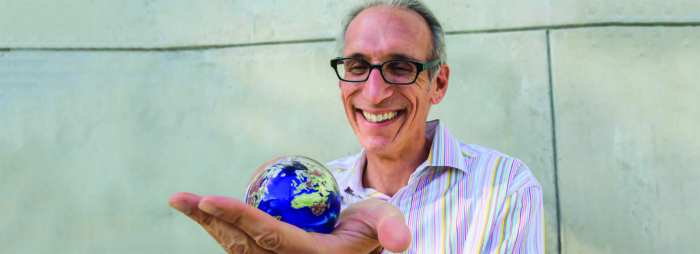
Dr. Ulysses J. Sofia, or U. J., as he prefers to be called, is a scientist and an adventurer. During the week, his work as an astrophysicist has him probing the secrets of the universe through the study of interstellar dust. And, on weekends, he and his wife, Heidi, regularly trek to far-flung places across the globe in search of new experiences. Yes, that’s right—global trips, in a single weekend.
One need only spend 10 minutes with the new dean of the W.M. Keck Science Department to catch his enthusiasm about both the terrestrial and cosmic voyages that await students and faculty of Claremont McKenna, Pitzer, and Scripps Colleges—and understand why he is just the right person to lead them.
“As soon as I set foot on the campus, I knew this was the right fit. It’s a really difficult position: reporting up to three colleges, supporting four different disciplines, but it feels right,” says U. J. “I love it! We have a lot to do!”
As the dean, U. J. is chartered with mentoring faculty, supporting students, teaching occasional classes, and working alongside leadership at the three undergraduate colleges to expand the science complex. At Keck, more than 3,000 students explore a range of scientific disciplines and conduct research under the guidance of more than 47 full-time faculty who, like U. J., have found their place and are following their passions in a liberal arts environment.
U. J. began his own college career at a large research university before transferring to Wesleyan University, a liberal arts college, during his junior year. “It was like the angels singing—I thought, this is where I belong, this feels right. I learned all of my physics, all of my astronomy in those two years.”
U. J. earned his PhD in astronomy with a concentration in physics from the University of Wisconsin-Madison. He began his academic career in 1998 as a professor at Whitman College, eventually moving on to American University, where he served as the associate dean for research. At both schools, he taught an introductory class for non-scientists on relativity and quantum mechanics that was a perennial favorite. He plans to bring it to Keck next year and relishes the opportunity.
“No matter how many times I teach the class, the students are nearly evenly divided between those who love the fact that our universe isn’t intuitive, that it doesn’t make sense in our everyday lives, and those who are intensely uncomfortable with this, who just don’t want a universe that doesn’t make sense to them,” he explains.
According to U. J., his office is always open, and there is plenty to see. There are blueprints of the new labs and offices planned for the W.M. Keck Science Center that he is glad to show. And there’s his fascination with colored glass—rows of intricately hand-blown orbs along his office credenza are displayed alongside Marvin the Martian collectibles that appreciative students have given him over the years.
Oh, and those global blitzes? The same irrepressible spirit of exploration that set his sights on the stars recently took him to the annual Harbin Ice and Snow Festival in northeast China to explore the inspiring manmade ice sculptures made possible by the region’s arctic climate. And that’s just one weekend.
Five Facts about U. J. Sofia
1 His degree is in astronomy, but he is also a heliophysicist. Ask him about the sun, and he can talk about magnetic predictions: “We are going into a ‘down’ 30-year solar cycle.”
2 He is a Formula One racing fan, and some of his global travel blitzes involve attending this highest class of single-seat auto race sporting events.
3 He studied Swahili for a year in college. “Why? Because I could! It’s an experience unique to a liberal arts college, and really something you can’t do anywhere else.”
4 Although he loves art, music, and theater, he is self-admittedly “one of the worst singers in the world.”
5 His top advice to students interested in careers in science is to get involved around research as early as possible. “Get involved in a lab. Get involved in study groups. Collaborate early and often.”

